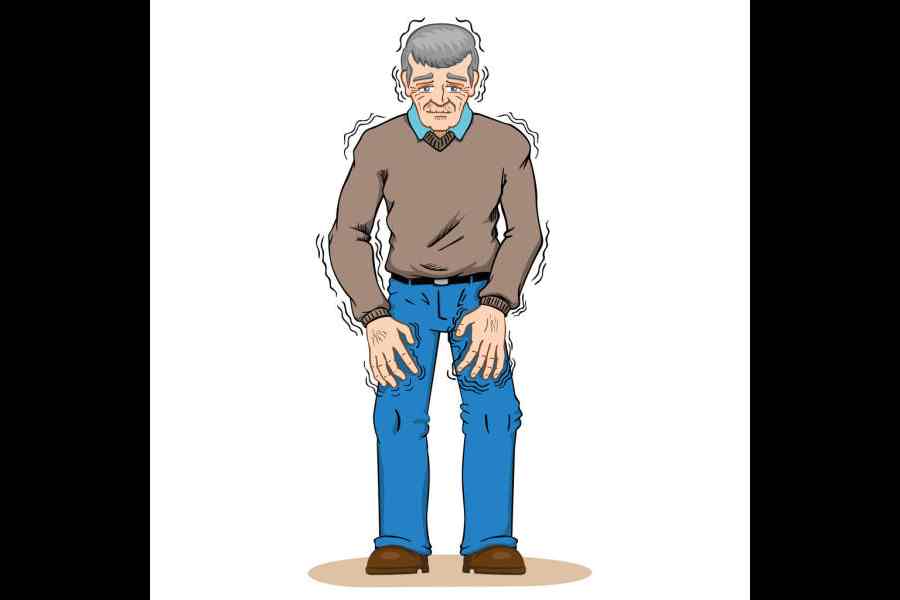Sometimes, when a person tries to reach for an object or drink a glass of water, his hand shakes. Initially, the tremor may be mild and barely noticeable. He can try to hide it under the table or by putting his hands in his pockets. If the head is affected, hiding is more challenging, but people have been known to try to hold their heads with both hands.
This is a familial essential tremor. It tends to start at a younger age than Parkinson’s and one side may be affected more than the other. The inheritance for this is autosomal dominant. This means that both males and females are affected. Many members of the family may have tremors, though it may skip a few generations. The severity may also vary from person to person.
The inherited damaged gene interferes with voluntary muscles. It can affect any body part, most often the hands, the neck, the larynx (resulting in a shaky voice) and, less frequently, the legs. The tremor disappears at rest and during sleep, and is made worse by stress, fatigue, caffeine and anxiety. It is not a prelude to Parkinson’s disease.
The main difference is the Parkinsons’ disease tremor. Unlike essential tremor, it is present mainly at rest and disappears when the person tries to do something. Clues to the diagnosis are a mask-like expressionless face, a shuffling gait and a tendency to fall forward.
Although both Parkinson’s disease and essential tremors are physical diagnoses, tests have to be done to rule out other causes for the abnormal movements. A hyperfunctioning thyroid gland and low levels of sugar, sodium and magnesium can cause correctable tremors. It may be due to a stroke reducing the blood supply to certain areas of the brain, certain types of dementia or brain tumours. Certain infections like AIDS or neurosyphilis can cause tremors. Sometimes, psychiatric medication can have a similar effect.
Alcohol has a depressant effect on the brain. People who drink regularly and then stop may develop tremors around 12 hours after their last drink. This is because the depressed nervous system becomes active again. Alcohol can cause liver damage, which can cause tremors.
Cigarettes do not really calm your nerves or reduce anxiety. The nicotine from tobacco enters the bloodstream and causes tremors.
It’s important to consult with a healthcare professional to determine the most appropriate treatment plan for individual cases of tremors, as the underlying cause and severity can vary widely.
The dopamine levels in the brain are decreased in Parkinsons’ disease; medication that increases the dopamine levels in the brain or mimics its actions can help. Commonly used medications are beta blockers, anti-convulsants and anti-anxiety agents. Injections of botulinum toxin (botox) can be used to treat specific types of tremors. Deep brain stimulation is a surgical procedure that involves implanting electrodes in certain brain areas to help regulate abnormal brain activity that causes tremors.
Occupational therapy or physical therapy is the mainstay of treatment. It helps individuals manage tremors, improve coordination and develop coping strategies for everday tasks.
Additionally, maintaining a healthy lifestyle by avoiding alcohol and coffee, exercising regularly, getting adequate sleep and using stress management techniques can be beneficial.
Some people find relief from tremors through alternative therapies such as acupuncture, biofeedback, yoga or tai chi. The evidence supporting their effectiveness is limited and mainly anecdotal.
Rarely, surgical procedures targetting a specific area of the brain or deep brain stimulation may be considered for severe tremors that do not respond to other treatments.
Having Parkinson’s or essential tremors does not reduce the life span. However, complications like falls because of poor balance and pneumonia because of shallow breathing can be fatal.
The writer has a family practice at Vellore and is the author of Staying Healthy in Modern India. If you have any questions on health issues please write to yourhealthgm@yahoo.co.in











